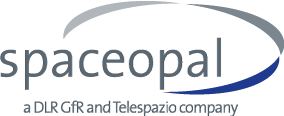15.12.2017
Galileo Launch #9 places 4 more satellites into MEO orbit
Four new Galileo satellites were successfully launched on December 12 from the European spaceport in Kourou, French Guyana. This launch is the second launch performed by an Ariane 5 launcher and brings the Galileo constellation to a total of 22 satellites launched so far: 4 in-orbit validation (IOV) satellites and 18 full operational capability (FOC) satellites. These four new satellites will reinforce the provision of Galileo Initial Services, with additional satellites to be launched over the coming years until the constellation reaches full operational capability in 2020.
The responsibility for this launch lies for the first time with the European GNSS Agency (GSA) with Spaceopal , a DLR GfR mbH and Telespazio companySpa – in its role as Galileo Service Operator.
The LEOP activities for this launch are overseen by an integrated team of specialists from the GSA, Spaceopal, also acting as Mission Director, and the operations team of the French Space Agency (CNES). LEOP operations are conducted from a dedicated control room in the CNES Centre Spatial de Toulouse, from which the team is overseeing all of the main LEOP stages.
After the completion of the main LEOP activities, the control of the new 4 satellites will be handed-over to the Galileo Control Centre (GCC D) in Oberpfaffenhofen operated by DLR-GfR as subcontractor of Spaceopal;
The GCC D will take over the command and control responsibility of the satellites and will perform the platform commissioning as well as final manoeuvers and the switch-on all subsystems of the spacecraft during the so called In-Orbit-Test (IOT) phase, which will involve also the other Galileo Control Center (GCC I) in Fucino, operated by Telespazio. At the end of the IOT phase, the new satellites will be inserted in the operational constellation to contribute to the Galileo services provision.
Spaceopal has signed at the end of 2016 the Galileo Service Operator contract with the GSA, and since then it is providing reliably the Galileo Initial Services to the User Community, being responsible not only for the Service Operations but also actively supporting the completion of the system deployment, which will extend the services coverage to reach full operational capability by 2020.
Spaceopal carries out these activities through the two Galileo Control Centres in Fucino and Oberpfaffenhofen, as well as the GNSS Service Centre in Madrid and a network of sites and stations distributed around the globe and connected by the Galileo Data Dissemination Network.
Galileo is Europe’s own global navigation satellite system, providing a highly accurate, guaranteed global positioning service under civilian control. Galileo is interoperable with GPS and Glonass, the US and Russian global satellite navigation systems. By offering dual frequencies as standard, Galileo is set to deliver real-time positioning accuracy down to the meter range.

